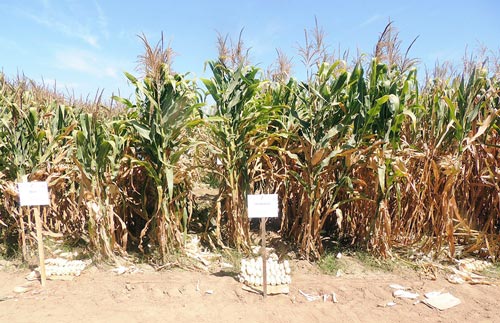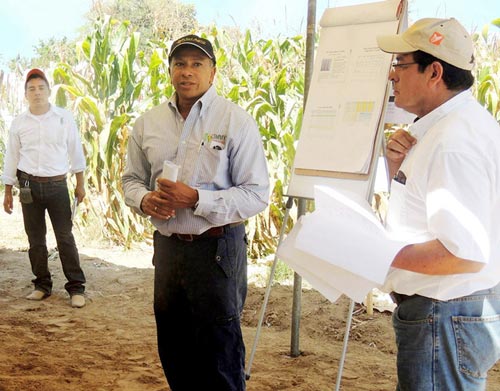
Mexican seed producers and researchers who participate in the Sustainable Modernization of Traditional Agriculture (MasAgro) initiative met recently at El Cantón, a location close to Puerto Vallarta, Jalisco, Mexico, where experimental plots aimed at producing high quality and higher yielding hybrid maize seed are planted.
“The purpose of these experimental plots is to adapt the best production technologies to three mega-environments (highland valleys, tropics, and subtropics), observe the performance of seed targeted for agricultural areas where MasAgro operates, and identify new locations where hybrid maize seed with high physical and genetic quality can be produced,” explained Félix San Vicente, leader of the maize component of MasAgro.
This strategy aims to coordinate the development and multiplication of hybrid maize seed adapted to rainfed areas that are a priority for MasAgro, as well as to promote its adoption among medium- and small-scale maize farmers.
People attending the field day received information on the yield of maize hybrids developed by participants in MasAgro’s Network of Seed Sector Members and Cooperators, which includes 35 Mexican seed companies and agricultural research institutes. Both white and yellow hybrids were presented––seven for highland valleys, five for the tropics, and four for the subtropics. The seeds were derived from simple and triple crosses that have higher adaptation and yield capacity. The materials presented are at the pre-commercial stage, but most are already available to seed companies that belong to the network.

CIMMYT researchers explained that the objective is to endow seed currently being improved using conventional breeding methods with key agronomic traits such as adaptation capacity, high yield, days to flowering, and staggered sowing in order to better synchronize flowering.
Members of the MasAgro network hope to increase the hybrid
maize seed production area in the 2013 fall-winter cycle, thanks to the high adaptation capacity and good performance shown by materials developed for tropical, subtropical, and highland valley production areas targeted by MasAgro.
Also attending the event were representatives of 23 Mexican seed companies, as well as researchers from Mexico’s National Forestry, Agricultural, and Livestock Research Institute (INIFAP) and academics from the Southern Regional University Center of Chapingo Autonomous University (UACh).
 Capacity development
Capacity development